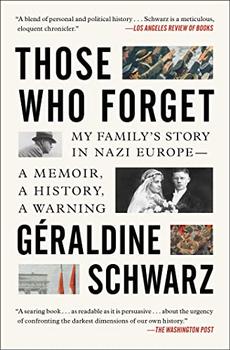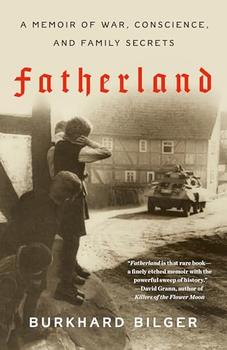Summary | Excerpt | Reading Guide | Reviews | Beyond the book | Read-Alikes | Genres & Themes | Author Bio

My Family's Story in Nazi Europe – A Memoir, A History, A Warning
by Géraldine SchwarzThose Who Forget, published to international awards and acclaim, is journalist Géraldine Schwarz's riveting account of her German and French grandparents' lives during World War II, an in-depth history of Europe's post-war reckoning with fascism, and an urgent appeal to remember as a defense against today's rise of far-right nationalism.
During World War II, Géraldine Schwarz's German grandparents were neither heroes nor villains; they were merely Mitlaüfer—those who followed the current. Once the war ended, they wanted to bury the past under the wreckage of the Third Reich.
Decades later, while delving through filing cabinets in the basement of their apartment building in Mannheim, Schwarz discovers that in 1938, her paternal grandfather Karl took advantage of Nazi policies to buy a business from a Jewish family for a low price. She finds letters from the only survivor of this family (all the others perished in Auschwitz), demanding reparations. But Karl Schwarz refused to acknowledge his responsibility. Géraldine starts to question the past: How guilty were her grandparents? What makes us complicit? On her mother's side, she investigates the role of her French grandfather, a policeman in Vichy.
Weaving together the threads of three generations of her family story with Europe's process of post-war reckoning, Schwarz explores how millions were seduced by ideology, overcome by a fog of denial after the war, and, in Germany at least, eventually managed to transform collective guilt into democratic responsibility. She asks: How can nations learn from history? And she observes that countries that avoid confronting the past are especially vulnerable to extremism. Searing and unforgettable, Those Who Forget is a riveting memoir, an illuminating history, and an urgent call for remembering.
Although the transition from history to analysis of current events is relatively abrupt, the placement of brief commentary on recent issues later in the book still works well considering that Schwarz's account is primarily chronological. Also, in deferring this commentary, she avoids turning off readers who disagree with her assessment or who pick up the book because of a specific curiosity about the historical rise of Nazism. In any case, the narrative is fascinating from start to finish, combining a top-notch family memoir with history and social criticism. Like many, I've pondered the Holocaust over the years, wondering how such a thing could happen, how average, well-meaning people could permit a climate in which others are systematically persecuted or killed. Those Who Forget is enlightening in that regard, and provides a lot of food for thought. Schwarz's warning, too, is an important one that should be heeded...continued
Full Review
 (884 words)
(884 words)
(Reviewed by Kim Kovacs).
 In Those Who Forget, author Géraldine Schwarz relates a visit her father paid to his parents' former home in Mannheim, Germany, looking for a specific "Stolperstein" installed outside the apartment.
In Those Who Forget, author Géraldine Schwarz relates a visit her father paid to his parents' former home in Mannheim, Germany, looking for a specific "Stolperstein" installed outside the apartment.
The word "Stolperstein" (plural "Stolpersteine") means "stumbling stone" or "stumbling block" in German. These small memorials to victims of the Nazi regime are concrete stones topped with brass plaques, each about 10 cm square, embedded outside the person's last-known residence. Each bears the words "here lived" followed by the individual's name, year of birth and their fate under Nazism (deportation, internment, etc.).
The Stolperstein project began to form in 1991, when artist Gunter Demnig created a paint line on the...

If you liked Those Who Forget, try these:

by Burkhard Bilger
Published 2024
A New Yorker staff writer investigates his grandfather, a Nazi Party Chief, in this "unflinching, gorgeously written, and deeply moving exploration of morality, family, and war" (Patrick Radden Keefe, author of Empire of Pain).

by Maria Hummel
Published 2015
The novel bears witness to the shame and courage of Third Reich families during the devastating final days of the war, as each family member's fateful choice lead the reader deeper into questions of complicity and innocence, to the novel's heartbreaking and unforgettable conclusion.